- Home
- Rick Mofina
Vengeance Road Page 10
Vengeance Road Read online
Page 10
Other women.
Because he paid them to satisfy the all-consuming demands of his secret compulsion. For years, he had kept it caged, but it gnawed at the edges of his control, growing intense, ravenous. His ears would ring, his head would throb, until it took over.
He would drive into the night.
Hunting.
Some women on the street were shocked by his needs, so he’d move on until he found the kind of women who could gratify him. Women who guarded secrets, especially when he paid them with extra cash, or with favors. Like, getting a pimp to back off. Or dealing with an abusive john, a crooked landlord. Or supplying drugs.
And so many times his relief gave him so much pleasure he lost consciousness.
That had been his secret life.
It worked because he was a good husband, a good father, a community hero whose group helped troubled women.
And it worked because he was a respected detective.
Often the women gave him information on a case. And that made him look good. Oh, it had worked so beautifully.
Bernice Hogan knew the real Karl Styebeck. How he missed her, sweet, sad Bernice. She guarded his secret. So did several others, including Jolene Peller.
But J.P. was strong. She’d managed to get out of the life. On the surface, Styebeck was glad. Deep down he still craved her and wasn’t sure he could let her go. But he had to contend with his mixed feelings privately because J.P. had earned the right to something better.
Sure, some of them deserved it.
Some of them didn’t.
Because of what they were.
Sinful whores who deserved—
Stop.
He was in trouble. Far greater trouble.
It began with the letter several months ago.
Then the phone calls started after that, long before they found Bernice.
At first they were hang-ups. Wrong numbers. The ID was always blocked. Then came the call that stopped him cold.
It came a few days before they’d found Bernice.
“Guess who, Karl?”
A call from the pit; the pit Styebeck had crawled from a lifetime ago.
His gut twisted. Even across decades of estrangement he’d recognized his brother’s voice, almost jubilant on the other end of the line. Styebeck said nothing as the feigned warmth of his brother’s tone dropped several degrees.
“Did you really think that we’d never find you, Karl?”
“What do you want?”
“I’ve been watching you, your wife, your boy, for a spell. I know all about you. You think you’re better than us. But I know what you do, Karl.”
“If you come near my family, I swear, I’ll—”
“We don’t care about them. You know who sent me and you know what you have to do.”
“You’re out of your mind. I’m not like you.”
“You’re one of us. It’s time you admitted the truth and faced your responsibilities.”
Like a scab being pulled from an old wound, Styebeck confronted the painful memories of his family’s disintegration.
“She’s dying, Karl. We almost lost Belva but I saved her. You got her letter. She told you what to do. Your time is running out. Are you going to do it before it’s too late? You’ve got twenty-four hours to give me the right answer, Karl, or I will pass judgment on one of your whores and give you a world of trouble.”
Styebeck relied on his training as a cop.
Don’t panic. Assess. Act. Resolve.
He did the only safe thing he could do.
That night and the next he patrolled Niagara in a rental and kept a vigil for anything threatening the women. He talked to each of them.
No one had seen anything, other than the regular jerks.
“Oh, there’s an asshole in a semi-rig, just the cab, acting a bit creepy,” one of the girls told Styebeck. “Got something on his door. Something about a sword. He was talking to Bernice last we heard.”
Alarm rang in Styebeck’s ears.
Don’t let it be his brother.
Styebeck had to handle this himself. He couldn’t risk calling in uniforms or backup; it was all too close to home. He’d spent the night searching for Bernice, for the rig. He went down to the park by Ellicott Creek.
But he saw nothing.
He searched the surrounding forest with his flashlight.
All in vain.
Then he went home.
That’s what happened.
That’s what he believed had happened, wasn’t it?
Because sometimes when his compulsion took control he would black out, lose track of time, suffer memory loss.
No! Not this time! That’s what happened. He’d tried to help!
Then Bernice Hogan’s murder hit the news.
Brent and Esko from the New York State Police had called him in for help on the Hogan murder. But Styebeck didn’t trust them. He’d sensed they knew something they were holding back. And why wasn’t he invited to join the task force? That’s when his friends, who didn’t know the truth, had stepped up. It helped, but it didn’t take care of all the heat.
Now Jack Gannon was getting closer.
Then he got the call that had pushed him over the edge. It came a few days after they’d found Bernice, on the night he’d clashed with Gannon.
“Look what you did, Karl. Everybody knows now,” his brother said.
“That was you. Not me.”
“You sure about that?”
Silence passed.
“Are you going to come back to us, Karl?”
Another moment passed.
“Think it over, I’ll be in touch.”
After the call, Styebeck felt the walls of his life closing in.
Brent and Esko were onto him.
Jack Gannon was onto him.
Everything he’d worked so hard to build was collapsing around him.
Styebeck froze.
A noise was coming from the back of the house, a tapping or ticking on glass. He went to his gun safe, got his Glock and slipped into the kitchen.
A man was standing in the breezeway between the kitchen and garage. Why didn’t his motion detector light this guy up? Styebeck switched on the floodlights, opened the door and stepped out, keeping his gun at his side.
The man had his back to him and was calmly smoking a cigarette.
Styebeck took stock of his snakeskin cowboy boots and jeans. He wore a T-shirt that flattered his well-toned upper body, and a ball cap. The man stubbed his cigarette into a patio tile and turned to face his brother.
They were boys the last time they’d seen one another. They stared at each other for a long moment, taking stock of the men they’d become.
Styebeck tightened his grip on his gun.
“I told you to never come here, Orly.”
“You’ve grown into a disappointment, Karl,” his brother said, glancing at the gun then shaking his head. “A big disappointment.”
“I told you not to come here. Ever.”
“There’s not a lot you can do now, is there?”
“It’s over. I’m going to bring you in and tell them everything about where we come from and what you did.”
“What I did?” Orly laughed.
“You’re sick. You need help.”
“I’m afraid it’s a little more complicated than you think. You see, I took precautions in case you were planning to turn me over to your police friends. No matter what you do, you’re involved now. Up to your eyeballs.” Orly stepped forward. “It’s time you paid some respect, Karl. Time you own up to your responsibilities because I fixed it good.”
“There’s no way you can implicate me.”
“No? Give this a whirl.” He tossed a DVD at him. “Your whore’s last words. I saved them for you. Now, you give it a spin and I’ll keep in touch, hero boy. Shee-it!”
Orly Styebeck’s laughter faded as he sank into the darkness.
“Karl?”
Alice was approaching from
the living room to the breezeway; Styebeck slipped the DVD into his pocket.
“I heard voices. Oh my God, why do you have your gun? Karl, what’s going on?”
Alice’s hair was messed, her eyes red rimmed, worry etched in her face as he backed her into the house soothing her.
“Who were you talking to just now?”
“It’s nothing. A cat tripped the motion sensor. It’s nothing. We’re all on edge, Alice. Take a pill and get back to sleep, honey. I’ll double-check the locks and be right up.”
She looked into the night, seeing nothing, hearing only crickets, before she returned. “Promise me you’ll be right up.”
“Promise.”
Styebeck went to his study, turned on his computer and played the DVD, which displayed shaking images of a forest at night then blurry pictures of a woman.
It was difficult to distinguish what was unfolding.
But then he recognized the woman’s voice as soon as she spoke.
“Mr. Styebeck, please, I beg you…oh God no…please, Karl…NO!”
It was Bernice Hogan.
In the final moments of her life.
23
As Jack Gannon showered the next morning, needles of hot water revived his tired muscles but didn’t thaw his impression of Styebeck.
As cold as an executioner.
Did that make him guilty?
And something unholy was going on between Styebeck and Fowler.
The new facts took this story into a wicked realm, making him wonder if Ascension Park’s hero detective was a Jekyll-and-Hyde case, especially considering Tuesday’s information that Styebeck admitted his desires “were sick” and had blamed his father.
His father?
As Gannon dressed he decided to dig deeper into Styebeck’s past. He was going to dissect his career, climb up and down every branch of his family tree.
He started making a full-court press on all public, federal, state and local records he could get. Then he made calls to sources, starting with a woman he knew in the Ascension Park personnel department who owed him a favor. After launching his research, he made coffee and had just grabbed a bagel when his phone rang.
“Gannon?”
“Yes?”
“It’s Fowler. Can you come into my office now?”
He’d expected this call.
“Is this about last night?”
“Just get in here.”
Thirty minutes after the call, Gannon was in the newsroom.
As he headed to Fowler’s office he sensed an undercurrent; something grave was going on. Conversations halted; people in the middle of phone interviews gazed at him.
“Gannon!”
Fowler was cutting across the metro section toward him, tie loosened, collar button undone, sleeves rolled to the elbow. A clipboard listing the morning’s assignments was in his left hand, which he’d raised to point to his box-shaped, glass-walled office.
“In there. Now.”
Fowler shut the door behind him.
“Give me your Sentinel cell phone.”
Gannon put it on the desk.
“And the paper’s credit card.”
“Is this about last night?”
Gannon produced the plastic card he’d used for trips and expenses. It snapped when he put it on Fowler’s desk next to the phone.
“You going to tell me what’s going on?”
“You’re going to stand there and act like you don’t know?”
Fowler slid the surrendered items into the top drawer of his desk.
“Know what, Nate?”
Fowler waved to Kathy, his assistant. She entered with an envelope, handed it to Fowler then left, keeping the door open.
Fowler gave the envelope to Gannon.
“What’s this?”
“You’re fired.”
“What?”
“There’s severance pay and vacation.”
Two uniformed security officers filled Fowler’s doorway.
“I didn’t want to do this, but you left me no choice. Your actions are indefensible and do not represent this newspaper. Kathy will collect your personal items from your desk and send them to you later.”
Fowler nodded to the security guys, big, unsmiling strangers.
“Hold on, Nate. I don’t understand.”
“You’re unbelievable, Gannon.”
“Come this way, sir,” one of the security men said.
At that moment, Paul Capresey, a news photographer, fired several frames before Gannon and the officers got into the elevator car. It was a tense silent descent. Gannon could smell cologne. A tattoo of a spiderweb reached above the neckline of one of the officers.
The doors opened to the lobby where Gannon was met by Pete Martinez, a Sentinel reporter, who held a small recorder in front of him. Martinez walked quickly alongside Gannon as the security people hurried him to the Sentinel’s glass doors.
“Pete, what’s going on?”
“Jack, I need your reaction to Styebeck.”
“What reaction? For what?”
At that instant Gannon saw a tangle of reporters in the street, people he knew. News cars and vans were parked behind them.
Was that a satellite truck?
The officers released Gannon and bright camera lights blazed, cuing the press pack to advance. Microphones, lenses and hardened faces lurched at him with an eruption of questions.
Gary Golden fired first.
“Jack, what’s your response to Karl Styebeck’s wife?”
“What about her?”
“She overdosed last night.”
“What?”
“According to Styebeck, it happened after you crashed a fund-raiser and publicly accused him, in front of his wife and friends, of visiting hookers and murdering Bernice Hogan.”
24
Jolene Peller was not alone in her dark prison.
Her encounter had sent her scurrying back to her mattress.
She’d pushed herself hard into her corner, trembling as she contended with the fact that a few feet from her someone else was alive.
Enemy? Or ally?
Jolene’s nostrils flared as she panted.
Adrenaline rushed through her body, giving rise to the primal instinct to fight. But at the same time Jolene struggled to be rational.
It could be Bernice.
Ashamed and angered at herself, Jolene tore at her gag with such ferocity she loosened it just enough to allow her to breathe easier.
And to speak.
Her jaw welcomed the relief and she swallowed several times before she whispered.
“Bernice?”
Jolene crawled through the blackness to the person moaning on the floor.
“Is that you, Bernie? It’s Jo. It’s going to be okay. I’m going to get us out of here. Be calm while I try to help you, okay?”
A muffled moan—the soft tone of a female—rose from the floor as Jolene’s bound hands explored the stranger’s body.
She felt fabric. Thin fabric. There was warmth under it. A T-shirt. She felt sturdier fabric. Denim. Legs. Shoes. Sneakers, or tennis shoes. Legs and ankles unbound. Moving upward she felt a flat stomach. Curves. The ridged outline of a bra. This woman had a larger bust than—this wasn’t Bernice.
Jolene felt warm skin. Arms, leading to binding and thick coils of duct tape around the wrists, just like hers.
Jolene felt the woman’s neck then the binding around her mouth, a dampened rag wedged between her upper and lower jaw, knotted tight as a cord behind her head.
“Let me help you.”
Jolene tried to slide the rag down at the back of the woman’s neck. The woman rolled her head from side to side, resisting Jolene’s help.
“Honey, be still, let me help. I’m your friend. I’m going to help.”
Jolene could feel the woman’s entire body shaking. She was in shock. Jolene tried to soothe her but the woman flinched.
“Take it easy,” Jolene said. “Let me try to loo
sen the gag on your mouth.”
The woman moaned but stilled herself long enough for Jolene to work on the gag. Firmly Jolene pushed and pushed until she managed to slide it lower, so that it loosened and the woman drew air into her mouth.
Jolene stroked her hair.
“Isn’t that better? It’s better, right?”
No response.
Time was impossible to measure.
Jolene had no way of knowing how much of it had passed. She felt like they were underwater in a dark river, rushing into the eternal night. As they drifted in and out of consciousness, Jolene wondered about the other woman.
Who was she? How did she get here? Did she know about Bernice? Or who had kidnapped them? Where were they going?
The stranger was in worse shape than Jolene.
The woman never spoke.
She would come to, roll her head and groan.
“That’s okay,” Jolene said. “We’re in this together. I can be strong for both of us. I’ve got a good mother. I’ve got a beautiful little boy. I’ve got a new life waiting for us in Florida. I’ve been through some tough times and I’m not going to let my family down. Or you. You’ll see.”
The woman never responded.
“I’m going to see what you have in your pockets,” Jolene said. “Maybe you’ve got something in there that can help us.”
Like a cell phone. Keys, a knife. Jolene turned the woman on her side and checked her rear pockets. Nothing. Then she checked her front left pocket and found a small plastic box. She shook it. By the sound and cinnamon smell, she guessed it was breath mints.
Jolene felt something hard in the woman’s right pocket, managed to slide her fingers in and tugged out something metal, jingling.
Keys.
Good.
Jolene felt the key ring, a few metal keys and a small cylinder. Her fingers assessed the cylinder. It had a smooth tip, like glass, a button like a—Jolene pushed—small flashlight!
A flash of bright light burst on the horror.
Jolene gasped.
The woman’s face was a surreal stew of bloodied torn flesh; her T-shirt and jeans were brown with dried blood.
Then all went dark again.
The flashlight’s tiny batteries had slipped from the cylinder, clunked on the floor and rolled in the darkness.
“No!”
Jolene groped for them.

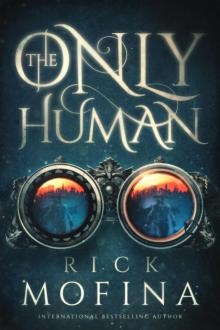 The Only Human
The Only Human Tom Reed Thriller Series
Tom Reed Thriller Series![[Tom Reed and Walt Sydowski 04.0] No Way Back Read online](http://i1.bookreadfree.com/05/tom_reed_and_walt_sydowski_04_0_no_way_back_preview.jpg) [Tom Reed and Walt Sydowski 04.0] No Way Back
[Tom Reed and Walt Sydowski 04.0] No Way Back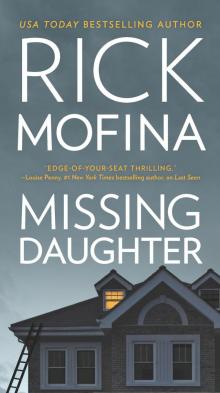 Missing Daughter
Missing Daughter Their Last Secret
Their Last Secret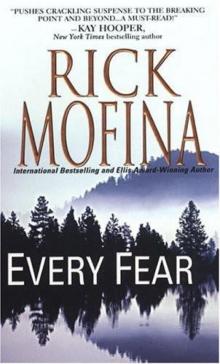 Jason Wade - 02 - Every Fear
Jason Wade - 02 - Every Fear In Desperation
In Desperation Every Second
Every Second Full Tilt
Full Tilt Search for Her
Search for Her The Last Pursuit
The Last Pursuit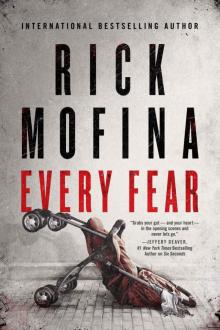 Every Fear
Every Fear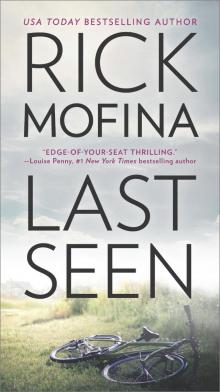 Last Seen
Last Seen The Panic Zone
The Panic Zone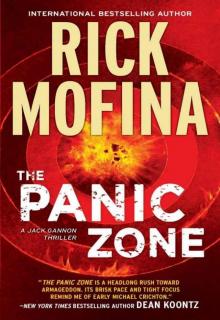 The Panic Zone jg-2
The Panic Zone jg-2 Free Fall
Free Fall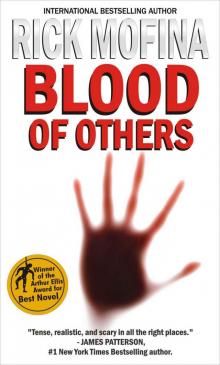 Blood of Others
Blood of Others![[Jason Wade 02.0] Every Fear Read online](http://i1.bookreadfree.com/i1/03/31/jason_wade_02_0_every_fear_preview.jpg) [Jason Wade 02.0] Every Fear
[Jason Wade 02.0] Every Fear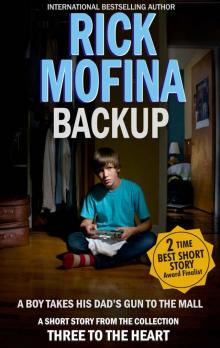 Backup
Backup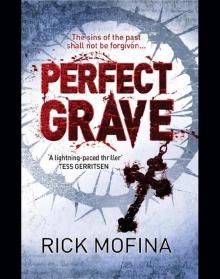 Perfect Grave
Perfect Grave Into the Dark
Into the Dark Whirlwind
Whirlwind Perfect Grave jw-3
Perfect Grave jw-3 If Angels Fall (tom reed and walt sydowski)
If Angels Fall (tom reed and walt sydowski) Six Seconds
Six Seconds If Angels Fall
If Angels Fall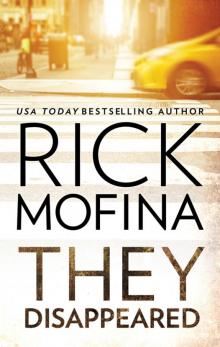 They Disappeared
They Disappeared Vengeance Road
Vengeance Road Before Sunrise
Before Sunrise A Lifetime Burning in a Moment
A Lifetime Burning in a Moment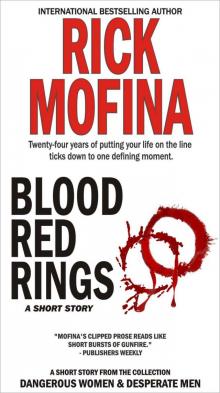 Blood Red Rings (Dangerous Women & Desperate Men)
Blood Red Rings (Dangerous Women & Desperate Men) As Long As We Both Shall Live (Dangerous Women & Desperate Men)
As Long As We Both Shall Live (Dangerous Women & Desperate Men)![[Tom Reed and Walt Sydowski 01.0] If Angels Fall Read online](http://i1.bookreadfree.com/i2/04/12/tom_reed_and_walt_sydowski_01_0_if_angels_fall_preview.jpg) [Tom Reed and Walt Sydowski 01.0] If Angels Fall
[Tom Reed and Walt Sydowski 01.0] If Angels Fall Cold Fear
Cold Fear Be Mine
Be Mine Three Bullets To Queensland
Three Bullets To Queensland